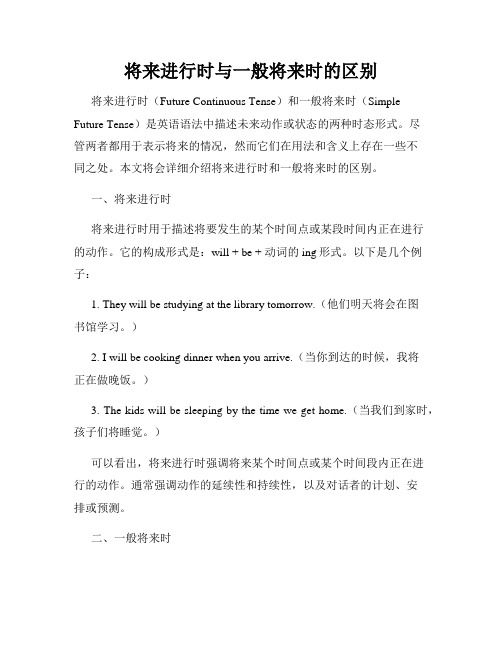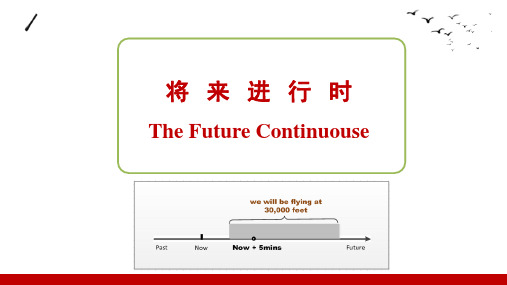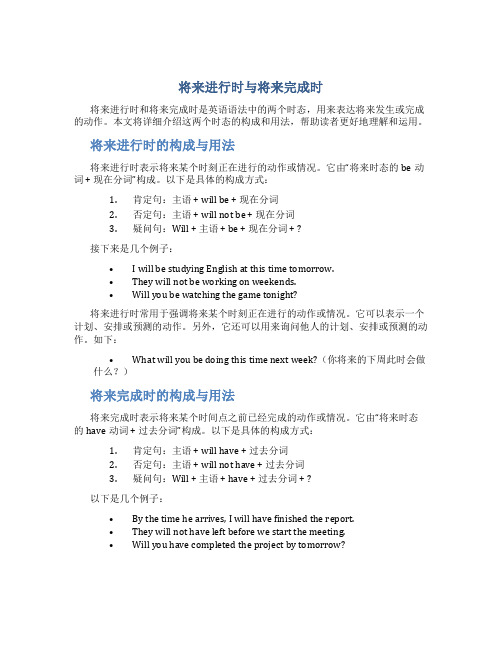英语语法:将来进行时
将来时态的常见表达方式例词

将来时态的常见表达方式例词将来时态是英语语法中的一种时态,用于表示将来发生的动作或事件。
在英语中,有多种方式可以表达将来时态。
下面是一些常见的将来时态表达方式及相应的例词。
1. 将来进行时 (Future Continuous)将来进行时用于表示在将来某个时间正在进行的动作或事件。
例词:Tomorrow at this time, I will be studying for my exam.2. 将来完成时 (Future Perfect)将来完成时用于表示将来某个时间已经完成的动作或事件。
例词:By the end of next year, she will have visited five different countries.3. 将来完成进行时 (Future Perfect Continuous)将来完成进行时用于表示将来某个时间开始并持续到这一时间的动作或事件。
例词:By the time you arrive, I will have been waiting for two hours.4. 使用情态动词 (Using Modal Verbs)情态动词可以用于表示将来时,常见的情态动词有will,shall,can,may等。
例词:She will go to the party tonight.5. 使用going to结构 (Using "going to" structure)"going to"结构用于表示根据现有证据或计划将要发生的动作或事件。
例词:I am going to buy a new car next month.6. 使用现在时态 (Using Present Tense)有时,将来时态可以用现在时态来表示,特别是当时间表或日程已经确定。
例词:The train leaves at 7:30 tomorrow morning.7. 使用时间状语从句 (Using Time Clauses)时间状语从句可以用于表示将来时态,常见的引导词有when,after,before等。
将来进行时与一般将来时的区别

将来进行时与一般将来时的区别将来进行时(Future Continuous Tense)和一般将来时(Simple Future Tense)是英语语法中描述未来动作或状态的两种时态形式。
尽管两者都用于表示将来的情况,然而它们在用法和含义上存在一些不同之处。
本文将会详细介绍将来进行时和一般将来时的区别。
一、将来进行时将来进行时用于描述将要发生的某个时间点或某段时间内正在进行的动作。
它的构成形式是:will + be + 动词的ing形式。
以下是几个例子:1. They will be studying at the library tomorrow.(他们明天将会在图书馆学习。
)2. I will be cooking dinner when you arrive.(当你到达的时候,我将正在做晚饭。
)3. The kids will be sleeping by the time we get home.(当我们到家时,孩子们将睡觉。
)可以看出,将来进行时强调将来某个时间点或某个时间段内正在进行的动作。
通常强调动作的延续性和持续性,以及对话者的计划、安排或预测。
二、一般将来时一般将来时用于描述将来发生的动作或事件,通常没有强调动作的延续性或持续性。
它的构成形式是:will + 动词的原形。
以下是几个例子:1. I will visit my grandmother next week.(我下周会去看望我的奶奶。
)2. The concert will start at 8 PM tonight.(今晚音乐会将在8点开始。
)3. She will call you as soon as she arrives.(她一到就会给你打电话。
)可以看出,一般将来时用于描述将来某个时间发生的动作或事件,并没有强调动作的持续性。
通常表示意愿、承诺、预测、计划或预测。
三、1. 强调不同:将来进行时强调动作的持续性和延续性,而一般将来时则没有这种强调。
高中英语知识点归纳动词的将来进行时

高中英语知识点归纳动词的将来进行时动词的时态在英语语法中起着至关重要的作用。
将来进行时是英语时态中的一种形式,用来表达将来某个时间点正在进行或即将进行的动作或状态。
在高中英语学习中,我们需要了解并正确使用将来进行时。
本文将对这一知识点进行归纳总结,并给出相应的例子。
一、构成将来进行时将来进行时的构成相对简单,只需在动词的将来时助动词“will”之后加上“be”动词的现在分词形式。
下面是具体的构成规则:肯定句:主语 + will be + 动词的现在分词形式例句:He will be studying for the exam tomorrow.否定句:主语 + will not be + 动词的现在分词形式例句:She will not be attending the meeting after school.疑问句:将助动词“will”提前到主语之前例句:Will they be playing basketball this weekend?二、将来进行时的用法1. 表示将来某个时间点正在进行的动作或状态例句:Tomorrow at this time, I will be taking an English test.翻译:明天此时,我将会正在进行一次英语考试。
2. 表示预定或计划的动作或状态例句:I will be meeting my friends for dinner tonight.翻译:我今晚将会与我的朋友们吃晚饭。
3. 表示对某个未来事件的推测或预测例句:She will be traveling to Europe next month.翻译:她下个月将会去欧洲旅行。
4. 表示对将来某个时间段内的频繁或惯常动作的描述例句:They will be going to the gym every morning during their vacation.翻译:他们在假期期间每天早上将会去健身房。
时态将来进行时

时态将来进行时将来进行时是表示在将来某个时间点或某段时间内正在进行或发生的动作。
它通常由助动词"will be"或"be going to be"加上动词的ing形式构成。
将来进行时的基本结构是:主语 + will be/ be going to be + 动词的ing形式将来进行时可以用来表示计划、安排、意图、预测和预见等跟将来有关的动作或状态。
在本文中,我们将探讨将来进行时的用法和例句。
一、将来进行时的用法1. 表示将来某个时间点进行的动作:I will be studying English grammar at 8 o'clock tomorrow.(明天早上八点我将在学习英语语法。
)2. 表示将来某段时间内进行的动作:They will be traveling around Europe for two months next summer.(明年夏天他们将在欧洲旅行两个月。
)3. 表示将来某一动作或事件已经被安排或计划:We are going to be having a meeting next Monday.(我们下周一将举行一次会议。
)4. 表示将来某一动作或事件是有意图或决心要做的:She will be starting her own business in the near future.(她计划不久的将来开办自己的生意。
)5. 表示预测或推测将来可能会发生的动作:He will be going to London next year.(他明年可能去伦敦。
)二、将来进行时的例句1. I will be waiting for you at the airport tomorrow.(明天我将在机场等你。
)2. They will be cooking dinner while we are watching TV.(我们看电视时他们将在做晚饭。
关于将来进行时的语法点

关于将来进行时的语法点将来进行时是英语中描述将来某一时间正在进行的动作、状态或事件的一种时态。
它用来表示将来某一时刻或时间段内正在进行的动作或状态。
本文将从语法规则、用法示例以及常见错误等方面来介绍将来进行时的相关知识。
一、语法规则将来进行时的构成是由“will be + 动词的现在分词形式”来表示。
其中,will be是表示将来时态的助动词,be是动词的原形,而现在分词形式则是将动词原形的词尾加上-ing。
例如:- I will be studying English tomorrow.(明天我将会在学习英语。
)- She will be working at the office tonight.(今晚她将在办公室工作。
)二、用法示例将来进行时通常用于以下几种情况:1. 表示将来某个时间点正在进行的动作或状态。
例如:- He will be having dinner at 7 o'clock tomorrow.(明天他将会在7点钟吃晚饭。
)- They will be watching a movie this weekend.(这个周末他们将会在看电影。
)2. 表示将来某一时间段内正在进行的动作或状态。
例如:- We will be traveling in Europe next month.(下个月我们将会在欧洲旅行。
)- The company will be holding a meeting all day tomorrow.(明天整天公司将会开会。
)3. 与表示将来的时间状语连用,表示将来某一时间点正在进行的动作或状态。
例如:- I will be sleeping when you arrive.(你到达时,我将会正在睡觉。
)- They will be studying in the library at 10 am.(上午10点钟时他们将会在图书馆学习。
)三、常见错误在使用将来进行时时,有一些常见的错误需要注意避免:1. 不要将will be后面的动词用进行时的形式。
英语语法-将来进行时

The Future Continuouse
1 将来进行时的定义
1.将来进行时表示将来某一时刻或某一段时间内可能正在 进行或发生的动作。
通常句子一定会有一个“表示将来某个时间点”的状语。 如: She will be doing her homework at 8 p.m. tonight.
2. I hope scientists _w__il_l_f_in_d_ (find) a cure for cancer.
3. A Chinese astronaut _w__il_l_r_e_a_c_h(reach)
Mars by 2050.
注意: 用于将来进行时的谓语动词必须是可延 续性动词, 短暂性动词则不可, 如上面5, 6题。
2 将来进行时的结构
主语 + shall/will+be +v.-ing + 其它
肯Байду номын сангаас 形式
will + be doing
否定 形式
will + not + be doing
问句 形式
will+主+ be doing?
He will be sleeping at this time tomorrow night.
He will be playing tennis at this moment tomorrow .
1 将来进行时的定义
2.将来进行时表示已经决定或安排好的要发生的动作或事 情;表示按预测将会发生的事情。
如: She will be coming soon. I'll be meeting him sometime in the future.
将来进行时与将来完成时

将来进行时与将来完成时将来进行时和将来完成时是英语语法中的两个时态,用来表达将来发生或完成的动作。
本文将详细介绍这两个时态的构成和用法,帮助读者更好地理解和运用。
将来进行时的构成与用法将来进行时表示将来某个时刻正在进行的动作或情况。
它由“将来时态的be动词 + 现在分词”构成。
以下是具体的构成方式:1.肯定句:主语 + will be + 现在分词2.否定句:主语 + will not be + 现在分词3.疑问句:Will + 主语 + be + 现在分词 + ?接下来是几个例子:•I will be studying English at this time tomorrow.•They will not be working on weekends.•Will you be watching the game tonight?将来进行时常用于强调将来某个时刻正在进行的动作或情况。
它可以表示一个计划、安排或预测的动作。
另外,它还可以用来询问他人的计划、安排或预测的动作。
如下:•What will you be doing this time next week?(你将来的下周此时会做什么?)将来完成时的构成与用法将来完成时表示将来某个时间点之前已经完成的动作或情况。
它由“将来时态的have动词 + 过去分词”构成。
以下是具体的构成方式:1.肯定句:主语 + will have + 过去分词2.否定句:主语 + will not have + 过去分词3.疑问句:Will + 主语 + have + 过去分词 + ?以下是几个例子:•By the time he arrives, I will have finished the report.•They will not have left before we start the meeting.•Will you have completed the project by tomorrow?将来完成时通常用于描述在将来某个时间点之前已经发生或完成的动作。
初中英语将来进行时详细讲解

初中英语语法将来进行时详细讲解将来进行时是英语中一种表示将来某一时间点或某一段时间正在进行的动作或状态的时态。
它由"will be + 动词-ing"构成。
将来进行时的用法如下:1. 表示将来某一时间点进行的动作:①I will be studying at 8 o'clock tomorrow morning.(明天早上8点钟,我将在学习。
)2. 表示将来某一段时间内进行的动作:①They will be traveling around Europe for a month next summer.(他们将在明年夏天旅行一个月的时间周游欧洲。
)3. 表示将来某一时间点正在进行的状态:①She will be waiting for you at the airport when you arrive.(当你到达时,她将在机场等待你。
)将来进行时常与表示将来某一时间点的时间状语连用,以明确动作发生的时间。
例如:①At this time tomorrow, I will be having dinner with my family.(明天这个时间,我将和我的家人一起吃晚饭。
)将来进行时也可以与其他动词时态连用,如将来进行时和将来完成时,表示将来某一时间点发生的动作正在进行,并有另一个动作已经完成。
例如:①By the time she arrives, we will be waiting for her at the train station.(她到达时,我们将在火车站等待她。
)将来进行时并不常用于表示计划、安排或意愿。
对于这些情况,一般使用将来时。
同时,将来进行时也不常用于肯定句中,更常用于疑问句或否定句中,表示对未来的不确定性或推测。
- 1、下载文档前请自行甄别文档内容的完整性,平台不提供额外的编辑、内容补充、找答案等附加服务。
- 2、"仅部分预览"的文档,不可在线预览部分如存在完整性等问题,可反馈申请退款(可完整预览的文档不适用该条件!)。
- 3、如文档侵犯您的权益,请联系客服反馈,我们会尽快为您处理(人工客服工作时间:9:00-18:30)。
Module 1 Grammar——The future continuous tense将来进行时Learning Aims:Knowledge: 1. To grasp the structure of the future continuous tense.2. To learn to use the future continuous tense though practice.Abilities: 1. To compare and summarize the differences between the simple future tense and the future continuous tense.2. To learn how to cooperate with your partnerMorality: To imagine the future life and make a prediction.Learning Procedures:Step 1. Lead-inThink about the following questions and write down your answers.1.What were you doing at this time yesterday?________________________________________________________________2.What will you be doing at this time tomorrow?________________________________________________________________3. What kind of car will you be driving in 2030?________________________________________________________________4. Will you be having English class at 2:00 tomorrow?______________________________________________________________________________它们分别是:______________________________________Step 2. The structure of the future continuous tenseObserve the following sentences and conclude the structure of the future continuous tense (Pay attention to the underlined parts):1. We will be flying to Morocco, in northern Africa.2. We will be traveling by camel, with local guides.3. We will be walking every day for almost two weeks.4. After that, we will be moving on to Tanzania.5. He is busy reviewing the lessons, so he will not be attending the New Year’s party tonight.6. Will you be working at the gym at this time tomorrow?_______________________________________________否定——_______________________________________________疑问——_______________________________________________1. From tomorrow to June 17, he ______________along the Yangtze River. (travel)2. Can you imagine what kind of car we ______________in 2020. (drive)3. We ______________ Yuelu Mountain at ten o’clock tomorrow morning. (climb)4. I ______________an exam at 2:30 tomor row afternoon, so I can’t go skating with you. (take) Step 3.The usages of the future continuous tenseObserve the following sentences and summarize the usages of the future continuous tense.1. (1) Will you be working out at the gym at this time tomorrow?(2) I must practice more because I will be putting on a performance at 7 o’clock tonight.(3) We’ll be walking every day for almost two weeks.(4) Toby will be climbing in the Himalayas all next week._______________________________________________________2. (1) I guess it will be raining heavily when you arrive in Beijing.(2)The weather report says that a terrible typhoon will be striking Fujian province in two days.(3)The weather man says that it will be snowing when you return from work at six o’clock.(4)The advanced science and technology will be helping us explore the outer space._______________________________________________________3. (1) When will we be meeting again?(2)Will you be moving on to Tanzania?(3)Will you be traveling on camels with local guides?_______________________________________________________4. (1)We’ll be flying to Morocco, in northern Africa on Friday evening.(2) China will be holding the Olympic Games on 8th August 2008.(3)You will be attending the College Entrance Examination from July 7th to 10th in 2010._______________________________________________________ Step 4.The differences between the simple future tense and the future continuous tense.Observe and compare the following sentences:1.(a) We’ll fly to Morocco, in northern Africa soon.(b) We’ll be flying to Morocco, in northe rn Africa on Friday evening.(a) According to the schedule, Toby will travel in the Sahara Desert in the near future.(b) According to the schedule, Toby will be traveling in the Sahara Desert on 30th June.一般将来时与将来进行时区别之一:__________________________________2.(a)I feel very tired now ,so I won’t go white-water rafting with you tomorrow.(b) Toby will be speaking at the meeting at 3 o’clock tomorrow afternoon because he is the chairman of the meeting.一般将来时与将来进行时区别之二:__________________________________ Step 5. Consolidations (当堂检测)1. At this time tomorrow, _____to Europe.A. we are going to flyB. We will be flyingC. We will flyD. We are to fly2. ——“Have you heard from Janet recently?” ——“No, but I ____her over Christmas.”A. sawB. will be seeingC. have seenD. have been seeing3. At this time tomorrow he ________to the party.A. is going to comeB. will be comingC. have seenD. have been seeing4. What do you guess mother _______ when I get home?A. is doingB. will doC. has been doingD. will be doing5.We ____underground or in space in 100 years’ time.A. will be livingB. will liveC. are going to liveD. are living。
